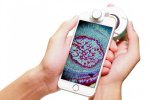 Water bear stuffed animal
Water bear stuffed animal
The beloved tardigrade—revered for its toughness, adored for its adorableness—isn’t a huggable critter. Fortunately, toymakers are well aware of this longing to cuddle a giant water bear, and there are a several plush tardigrades on the market. Hamee (Amazon) has a brown version for under $20, while ThinkGeek has a blue option for $39.99.
Observer’s notebook: trees
 This lovely naturalist’s notebook is both a guide to identifying trees and a diary for logging observations. In addition to images of leaves and other tree features, “this durable notebook also features ruled pages and blank maps to create your own tree census or simply reflect on the beauty of the planet’s longest-living, grandest organisms.” Princeton Architectural Press sells the book for about $15 (Amazon).
This lovely naturalist’s notebook is both a guide to identifying trees and a diary for logging observations. In addition to images of leaves and other tree features, “this durable notebook also features ruled pages and blank maps to create your own tree census or simply reflect on the beauty of the planet’s longest-living, grandest organisms.” Princeton Architectural Press sells the book for about $15 (Amazon).
 Fancy lab coat
Fancy lab coat
“Despite all of the advances in science and medicine, one thing has barely changed—the design...
 Women-in-space scarves
Women-in-space scarves
In addition to a scarf with the likeness of Mae Jemison (the first African-American woman in space; $140) and other women, Slow Factory sells bowties and bracelets with NASA imagery. The retailer also offers moon-print menstruation underwear (from Thinx) for $35.
 Tree of Life onesie
Tree of Life onesie
In On the Origin of Species, Charles Darwin wrote: “…the great Tree of Life, which fills with its dead and broken branches the crust of the earth, and covers the surface with its ever branching and beautiful ramifications.” So what better way to celebrate the arrival of offspring than by commemorating Charles Darwin’s sketch of the Tree of Life on a onesie? Fraggles & Friggles sells it for $20.
Smartphone microscope
 A number of vendors sell clip-on lenses to let you magnify specimens, and then view and record the images through a cell phone or tablet. The μHandy Smartphone Microscope, for instance, has a glass slide for specimens and focuses in on samples at one-micron resolution ($99.95). “You will be able to see cells, tissues samples, crystals and other inorganic materials, anthropods, fungi and countless microbes!”
A number of vendors sell clip-on lenses to let you magnify specimens, and then view and record the images through a cell phone or tablet. The μHandy Smartphone Microscope, for instance, has a glass slide for specimens and focuses in on samples at one-micron resolution ($99.95). “You will be able to see cells, tissues samples, crystals and other inorganic materials, anthropods, fungi and countless microbes!”

Living nightlight
Dinoflaggelates illuminate this dinosaur-shape “micro-aquarium.” According to BioPop, which sells the dino for $49.95, the critters can survive for up to three months on indirect sunlight, but feeding them weekly can support their population “indefinitely.”
 PIXABAY, BOHEDCharity
PIXABAY, BOHEDCharity
For the philanthropic-leaning loved ones on your shopping list, a little charitable giving can go a long way to boost holiday spirits. And science ain’t cheap. Several websites, such as experiment.com, allow givers to fund specific projects. And there are numerous charities, advocacy organizations, and nonprofit or academic organizations that direct funds to research as well. As always, do your homework—charitynavigator.org is a good place to start.
Thumbnail image: Flickr, JD Hancock
Interested in reading more?





